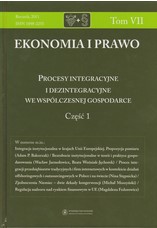Ekonomiczne i Prawne Aspekty Wprowadzenia Wspólnej Waluty Europejskiej Poza Strefą Euro Oraz Usztywniania Kursów Walut Względem Euro
European Common Currency Outside the Euro Zone and Fixed Exchange Rates vs. Euro: Economic and Legal Aspect
Author(s): Paweł Folfas, Magdalena Słok-WódkowskaSubject(s): Economic policy, International relations/trade, Law on Economics, EU-Accession / EU-DEvelopment, Financial Markets
Published by: Wydawnictwo Naukowe Uniwersytetu Mikołaja Kopernika
Keywords: Euro Zone; Euro; Fixed exchange rates; legal tender; euroization;
Summary/Abstract: On January 1, 1999, the euro came into existence as a European common currency (currency of Economic and Monetary Union). Additionally, the euro has become legal tender in states and countries outside the euro zone. In Europe, San Marino, the Vatican, Monaco and Andorra have adopted the euro. With the introduction of the euro, it was necessary to redefine monetary relations with those countries which had no national currency but which used the former national currencies of Member States of the euro zone. The euro has become legal tender also in the French overseas departments and territories which formerly used French francs: Mayotte, Saint Pierre and Miquelon, Martinique, French Guiana, Reunion, and Guadeloupe on the basis of a decision of the Council or as integral part of France. Moreover parts of the Balkans, where the Deutschmark has been used as the official currency – Kosovo and Montenegro, on January 1, 2002 also introduced the euro, however based on internal decisions, not on agreement with the EU. They can use the euro, but they are not allowed to issue banknotes and coins. Consequently, creation of the euro has launched the process of euroization – adopting the euro as legal tender outside the euro zone. Moreover, a number of states and countries, whose currency was pegged at a fixed rate to the French franc, Portuguese escudo or Deutschemark, decided to introduce fixed peg arrangements against euro.
Journal: Ekonomia i Prawo. Economics and Law
- Issue Year: 7/2011
- Issue No: 1
- Page Range: 371-390
- Page Count: 20
- Language: Polish

